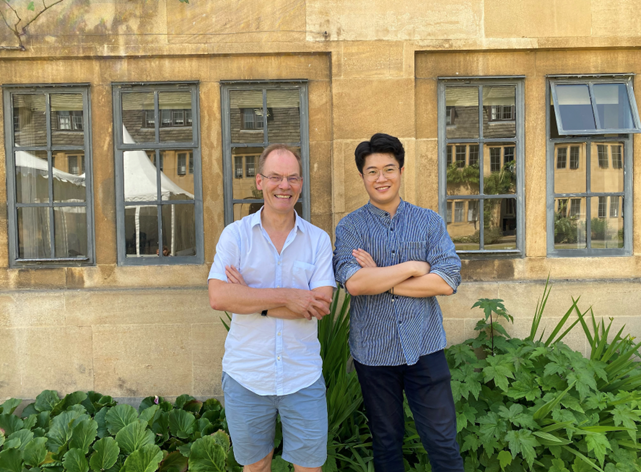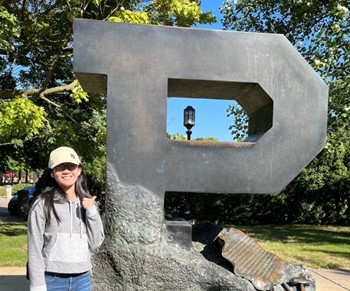|
||
|
||
|
| |||
| 04 JAN 2023 | ISSUE 17 | ||
|
| |||
| 5. Sharing from Awardees of Overseas Research Award for PhD Students | |
|
LIN, Yiqi First, I would like to thank the Department of Statistics of The Chinese University of Hong Kong for presenting me with the Overseas Research Award, and my supervisors, Prof. Song Xinyaun in our department and Prof. Fan Qingliang in the Department of Economics, for giving me the opportunity to visit the University of Oxford, one of the world’s leading universities, and undertake collaborative research there for three months. The primary object of my journey was to collaborate with Prof. Frank Windmeijer of the Department of Statistics, University of Oxford. He is an internationally renowned statistician and economist in the methodology of econometrics. During this visit, I started an in-depth collaborative research project with Prof. Windmeijer on the robust estimation of instrumental variables, which will be a part of my PhD thesis. During the three-month visit, Prof. Windmeijer arranged weekly two-hour one-on-one academic discussions. During the 12 individual meetings, Prof. Windmeijer helped me gain many unique insights that deepened my understanding of my research topic, answered my questions, and eventually helped me develop a brand-new methodology. In addition, he invited me to participate in seminars on causal inference in the Department of Statistics at Oxford University, a topic that is closely related to my research. The seminar is held every Friday, and professors and students from Oxford University, Cambridge University, and other prestigious universities in the UK are invited to share the latest developments in the field of causal inference. This has been very beneficial for my subsequent research. I was also honoured to be invited to present my research on instrumental variables at the seminar, which was followed by an intense discussion with the participants on the technical details of the research. This presentation and the ensuing discussion made me re-examine my research from a different perspective, which improved the quality of my research. In addition to the individual discussions with Prof. Windmeijer and the regular seminars, the rich academic activities organised by the Department of Statistics at Oxford University have also considerably broadened my horizons. A weekly coffee morning is held in the department, where students and faculty can socialise and share their latest ideas and insights. I have met many outstanding students and other professors of the department during this daily event. Outside the Department of Statistics, many weekly seminars and talks are hosted by other departments. I often attended lectures organised by the Economics and Mathematics departments, and these have opened new academic vistas to some extent, such as the “Using AI to Accelerate Scientific Discovery” by the CEO of DeepMind. Besides the academic atmosphere, the unique college culture of Oxford University is also fascinating. Unlike the standard university system, each student is assigned to a department and a college, which is responsible for life outside of education. The University of Oxford has 38 colleges, each with its unique architecture and living and learning spaces. In particular, the colleges have formal dinners, and I was lucky enough to be invited by my friends from Oxford to attend a formal dinner at Worcester College. The college’s dinner hall is as classical and solemn as the dinner hall shown in the Harry Potter movies. This experience is unique. As far as I know, among British universities, only Oxford and Cambridge universities have such an event. Finally, I would like to again thank the Department of Statistics of The Chinese University of Hong Kong and my supervisors for their help and support during my study trip.
Supported by the Overseas Research Award of our department, I visited Prof. Faming Liang, the Distinguished Professor of Statistics at Purdue University. Prof. Liang is one of the world’s most renowned statisticians in the field of advanced statistical computing methods to facilitate inference for high-dimensional data. It was indeed a remarkable experience to learn from such an outstanding researcher during my three-month visit. Purdue is situated in West Lafayette near the Wabash River, the state river of Indiana, and is characterised by a vibrant student life and peaceful surroundings. The campus is well landscaped with tranquil sidewalks, beautiful fountains, and red brick buildings scattered throughout. Take a walk around and you will see students holding various events or sitting around engrossed in their projects, while squirrels run around and chase each other day in and day out. What I enjoy most are the weird little traditions and myths shared by the students and alumni, who refer to themselves as Boilermakers. Legend has it that there are sealed tunnels connecting most of the buildings, one of which connects a Greek letter organisation and the oldest bar in town; that drinking from the Lions Head Fountain before exams will bring you good luck; and that if you forget to lock your bike, it can sometimes end up on the branch of a tree thanks to the tacit understanding between tree goblins and passers-by. Hanging around with friends and talking about these things became an integral part of my day. I have benefitted greatly from the research project I worked on with Prof. Liang’s group. Prof. Liang taught me the difference between traditional Markov Chain Monte Carlo (MCMC) algorithms and the advanced class of efficient stochastic gradient MCMC algorithms. The advanced MCMC algorithms greatly facilitate statistical inference for big data sets by resolving the scalability issue in Monte Carlo computing. Our new project, which was motivated by some recent works of Prof. Liang’s research group, was to further improve simulations of multi-modal distributions through a continuous version of contour stochastic gradient Langevin dynamics. The problem was challenging for me at first as it was more complex than the traditional MCMC algorithms with which I was familiar. It took me weeks of programming to enable the relevant algorithms to walk through the details and understand the full picture. Although I got stuck sometimes, the weekly meetings with Prof. Liang and discussions with students in his group always helped me untangle the core issue and move on to the next steps. What I learned during this visit about the advanced MCMC algorithms, such as stochastic approximation Monte Carlo and stochastic gradient Langevin dynamics, re-invigorated me and illuminated my planned research. I also attended the Distinguished Theme Seminar Series held in the department every Friday and gained insights into recent advances in statistical inference from the talks delivered by the invited scholars. I would like to express my most sincere gratitude to my host supervisor, Prof. Liang, and to my supervisor, Prof. Song, for their guidance and encouragement throughout my visit. I would also like to thank the Department of Statistics for offering me such a wonderful opportunity. I am grateful for the opportunity to visit Prof. Peng Ding in the Statistics Department, the University of California, Berkeley (UCB), with the support of the Overseas Research Award for PhD students in Statistics. I could not help saying “how times flies!” at the end of the exchange programme. I enjoyed the exchange life at UCB. The campus is sunny, and the lawns seems to shine in the sun. Many students lie on the lawns to enjoy the sun, or sit and read books, or play games on the lawns. They seem youthful, vibrant, and energetic. I admire their confidence. There is a hill called The Big “C” on top of the mountain behind the campus, which takes about 40 minutes to reach. We can enjoy the sunset there and relax after the day’s work. Prof. Ding publishes many papers on causal inference in the top journals each year, such as the Journal of the American Statistical Association. I collaborated with Prof. Ding on the project “Rerandomization under Wilcoxon rank test”. I was in charge of the derivation details, while Prof Ding was responsible for checking the proof and proposing a research direction worthy of investigation. We had regular meetings in his office. I was much inspired by Prof. Ding’s comments at these meetings. The project is underway, but I believe we will finish it soon. The statistics department at UCB organises many activities to bring the staff members and students together. We had a one-hour Social Hour every Tuesday. Free drinks and snacks were provided. The PhD students often gathered in the lounge, and one could join any conversation, which might be about leisure, research, and so on. At the end of the semester, the department hosted the annual spring picnic at a nearby park, celebrating the end of the academic year. We exchanged ideas about the just-concluded semester and shared travel plans for the summer holiday. The statistics department and the Simons Institute held regular seminars. I attended most of the seminars on causal inference, which greatly broadened my research horizons. The research topics of these seminars covered a broad spectrum, including exploring causal graphs with newly released data from Internet companies. I wish to express my gratitude to my new friends, Sizhu and Lei, who not only helped me adapt to life in US but also discussed research ideas with me. I gained a lot from the exchange life at UCB, and I will cherish this experience forever. I would like to express my deepest gratitude to my supervisor, Prof. Song Xinyuan, for encouraging me to participate in the programme; my host adviser, Prof. Ding Peng, for inviting me to visit UCB; and the Department of Statistics for offering me such a great opportunity.
|
|
|
|
|
|
Past Issue
| |
|
|
|
|
|



